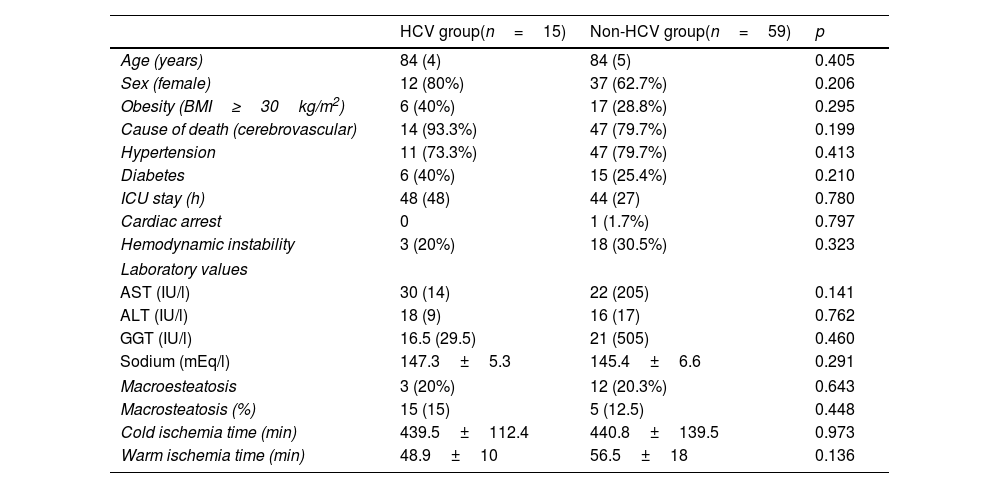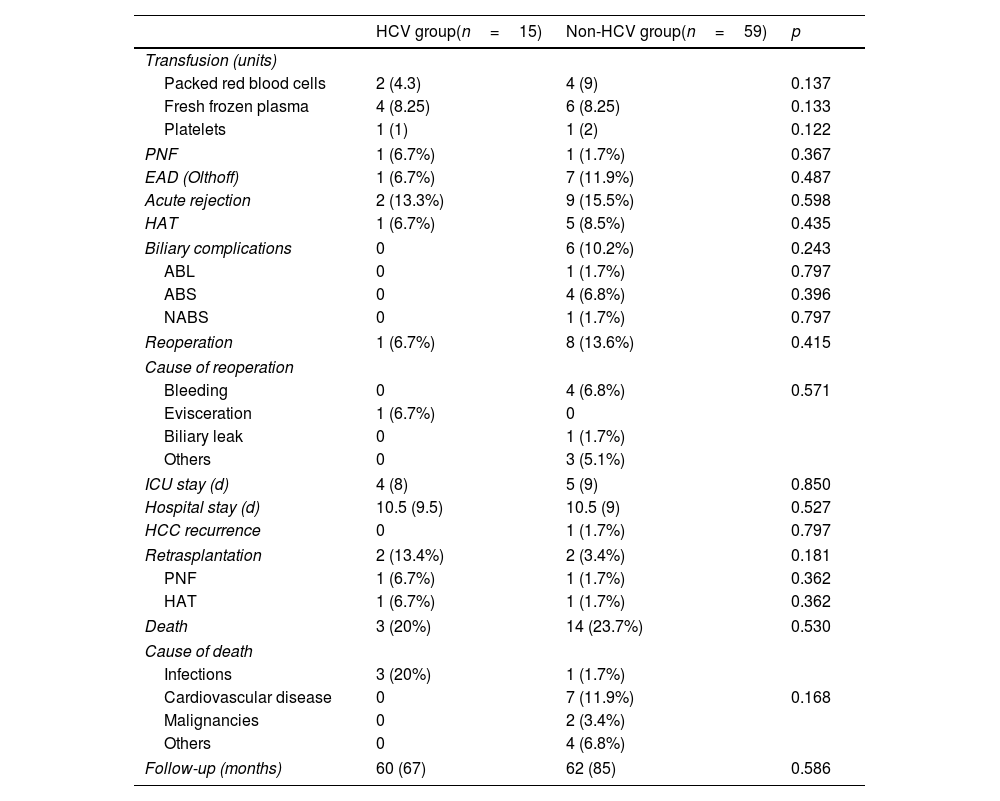Multiple studies have shown good results with the use of octogenarian donors in non-HCV recipients and its use is universally accepted worldwide. There are no studies analyzing differences between hepatitis C virus (HCV) and non-HCV recipients transplanted with donors≥80 years in the direct-action antivirals (DAA) period. The rate of liver transplantation (LT) using old donors is still low, and a change in the acceptance of these grafts could increase the liver pool available for LT.
Material and methodsSince the introduction of DAA therapy in our hospital in January 2014 to May 2022, 457 LT were performed, and 74 (16.2%) of these patients underwent LT with donors≥80 years. A cohort study was carried-out comparing 15 HCV-positive recipients vs. 59 HCV-negative patients during the period of the study.
ResultsRecipients were younger in the non-HCV group. MELD and subsequently DMELD were higher in non-HCV group. Nevertheless, the association of hepatocellular carcinoma (HCC) with HCV cirrhosis was higher than with non-HCV cirrhosis (86.7% vs. 28.8%; p<0.001), but there were no recurrences within HCV group and only 1 case in the non-HCV group. The 1-, 3-, and 5-years patient and graft survival were similar in both groups. Recipient age and intraoperative transfusion requirements were predictors of graft survival [(HR 1.10, 95CI 1.01–1.21; p=0.03) and (HR 1.03, 95CI 1.01–1.05; p<0.001), respectively].
ConclusionsIn conclusion, the use of octogenarian donors was a safe alternative to younger donors in HCV recipients requiring LT in the era of DAA with similar results to those obtained in non-HCV patients.
El trasplante hepático (TH) con injertos >80años ha demostrado buenos resultados en varios estudios, y su utilización es una alternativa ampliamente aceptada entre los distintos grupos de trasplante. Actualmente no hay ningún trabajo que compare los resultados del TH con injertos >80años en pacientes con infección por el virus de la hepatitis C (VHC) tratados con antivirales de acción directa (AAD) y pacientes VHC negativos. La tasa de TH con donantes de edad avanzada es todavía baja en algunos países, y una mayor utilización de estos injertos se asociará a un aumento significativo del pool de donantes.
Material y métodosDesde la introducción de los AAD en nuestro hospital en enero de 2014 hasta mayo de 2022 se han realizado en nuestra unidad 457TH, de los que 74 (16,2%) han sido realizados con donantes >80años. Entre estos 74 pacientes, 15 (20%) eran VHC positivos y 59 (80%) eran VHC negativos. Se realizó un estudio de cohortes comparando ambos grupos.
ResultadosLa edad del receptor fue mayor en el grupo de pacientes VHC positivo. El MELD y el DMELD fueron mayores en el grupo de pacientes VHC negativo. La tasa de carcinoma hepatocelular fue mayor en los pacientes VHC positivos (86,7% vs. 28,8%; p<0,001), pero no se evidenció ninguna recidiva tumoral en el grupo VHC positivo y solo se describió un caso entre los pacientes VHC negativo. La supervivencia a 1, 3 y 5años de paciente e injerto fueron similares entre ambos grupos. La edad del receptor y los requerimientos transfusionales intraoperatorios fueron factores predictores de supervivencia del injerto: HR: 1,10; IC95%: 1,01-1,21; p=0,03, y HR: 1,03; IC95%: 1,01-1,05; p<0,001), respectivamente.
ConclusionesEn conclusión, el uso de donantes >80años es una alternativa segura en receptores VHC positivos tratados con AAD, con resultados similares a los obtenidos en pacientes VHC negativos.












